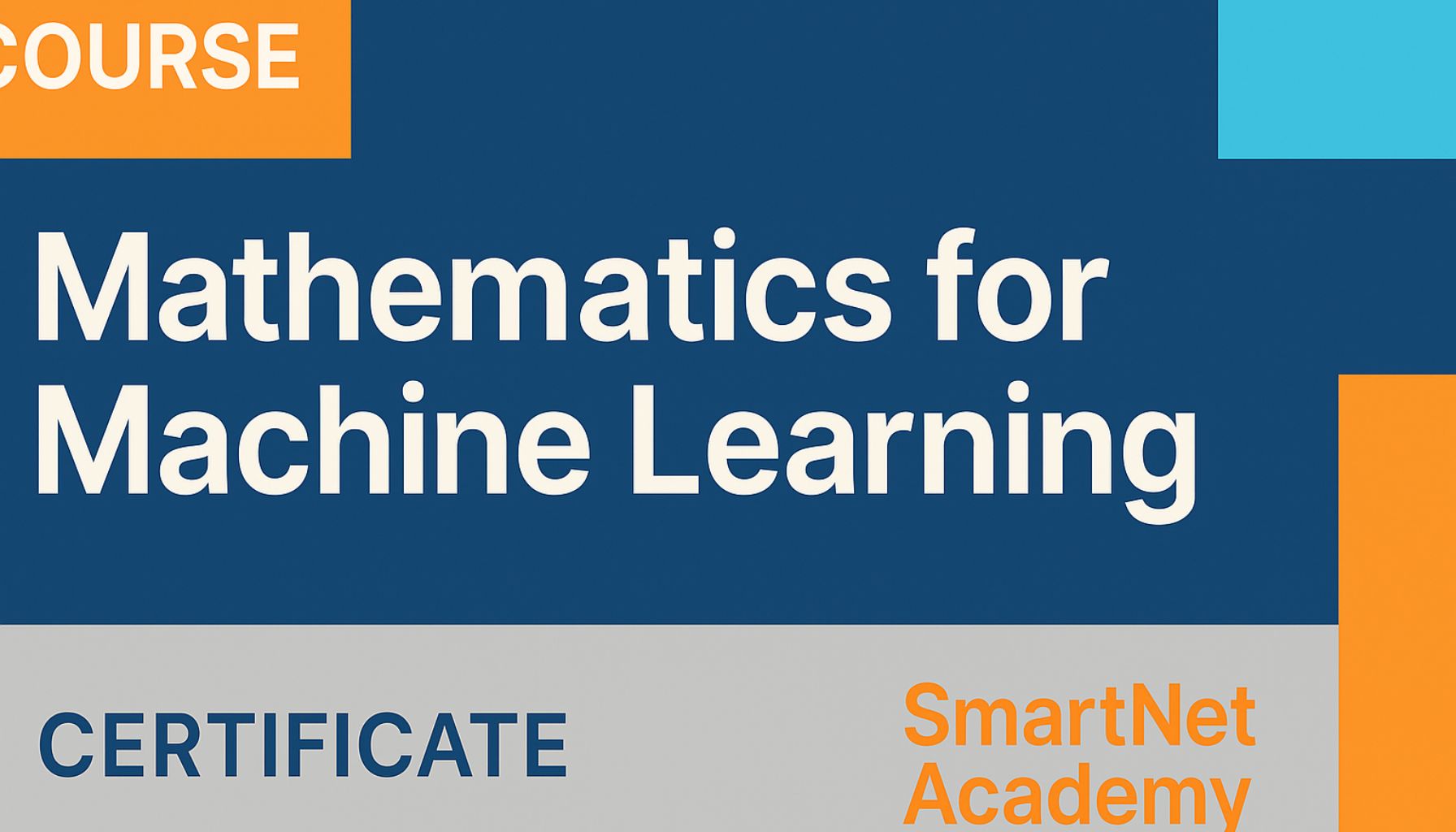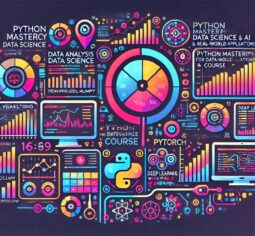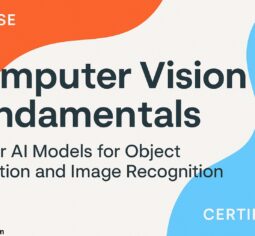In the rapidly evolving field of artificial intelligence and machine learning, one factor consistently determines success: a solid grasp of mathematics. SmartNet Academy offers the course “Mathematics for Machine Learning – Build a Strong Foundation for AI Mastery” to equip students with the necessary math skills for constructing, assessing, and enhancing machine learning models..
The curriculum connects theoretical mathematics with practical application while providing students with vital tools for the modern data-centric environment. We prioritize mathematical understanding as a fundamental element throughout your machine learning studies instead of treating it as supplementary material.
Why Mathematics is Essential for Machine Learning Success
In the world of machine learning, mathematical understanding is not optional—it’s foundational. While it may be tempting to rely solely on libraries and frameworks to build machine learning models, true innovation and performance optimization can only be achieved with a solid grasp of the underlying mathematics. This is why our course, “Mathematics for Machine Learning – Build a Strong Foundation for AI Mastery,” offered by SmartNet Academy, places mathematics at the center of your learning journey.
Moving Beyond the Code-First Approach
Many tutorials emphasize hands-on coding, giving learners access to powerful tools without explaining the logic that drives them. This approach often leads to confusion when models underperform or behave unpredictably. In contrast, understanding the mathematics behind machine learning gives you the confidence and insight needed to:
-
Diagnose model errors and performance issues
-
Tune hyperparameters with a clear understanding of their impact
-
Evaluate model complexity and bias-variance tradeoffs
-
Create custom algorithms tailored to specific problems
With mathematical intuition, you gain more than just technical competence—you acquire the strategic mindset necessary for effective model building.
The Mathematical Engines of AI
Every machine learning technique relies on a mathematical foundation. This course gives special focus to the following core areas:
-
Linear Algebra: Understand how vector spaces, matrix operations, and linear transformations influence data representation and transformations
-
Calculus: Learn how gradients and partial derivatives drive optimization processes like gradient descent
-
Probability Theory: Gain insights into classification, confidence intervals, and probabilistic reasoning
-
Statistics: Analyze distributions, measure model accuracy, and detect variance or bias in predictions
These tools allow you to see inside the model—not just how it works, but why it works.
Learn to Think Mathematically
This course is not just about memorizing formulas; it’s about shifting your approach to problem-solving. We use real-world case studies and industry-focused scenarios to demonstrate how mathematical thinking leads to smarter solutions.
Through this lens, you will:
-
Frame machine learning problems as mathematical challenges
-
Break down complex models into understandable parts
-
Evaluate outcomes with statistical precision
-
Make smarter, data-driven decisions in every project
Unlock Confidence and Control in Machine Learning
By mastering the math behind your models, you’ll unlock a new level of confidence in your machine learning projects. You’ll be able to explore algorithm choices with clarity, implement modifications with purpose, and explain your reasoning to stakeholders and team members.
This section of the course will empower you to lead, troubleshoot, and innovate—not just follow existing paths. That’s the true power of mathematical literacy in machine learning.
Core Topics Covered in the Course
The course “Mathematics for Machine Learning – Build a Strong Foundation for AI Mastery” offers a comprehensive, structured curriculum designed to walk you through the most essential mathematical principles used in machine learning systems. Each topic is presented with a balance of theoretical explanation and real-world application, ensuring you gain both clarity and confidence as you progress.
Whether you are training your first model or looking to scale up your AI skills, these core mathematical areas will empower you to understand, implement, and optimize machine learning techniques effectively.
Linear Algebra for Data Representation
Linear algebra is the backbone of machine learning. It provides the structure for organizing, manipulating, and transforming data. From image processing to neural network operations, vectors and matrices are used everywhere.
In this module, you will:
-
Understand how data is stored and processed in vectors, matrices, and tensors
-
Learn to perform key operations like matrix multiplication and transposition
-
Explore eigenvalues and eigenvectors and their relevance to Principal Component Analysis (PCA)
-
See how linear algebra is applied in deep learning architectures and feature extraction techniques
By the end of this module, you’ll be able to interpret model inputs and outputs mathematically and structure your datasets for optimal performance.
Calculus for Optimization and Model Training
At the heart of machine learning is optimization—refining models to make better predictions. Calculus is the tool that allows us to do this, particularly in the training of neural networks and other parameter-driven models.
You will dive into:
-
Functions, limits, and derivatives in the context of learning algorithms
-
Gradients and partial derivatives used to calculate model error
-
The chain rule and its role in backpropagation
-
Optimization algorithms such as gradient descent and learning rate tuning
This knowledge will enable you to understand the learning process itself, ensuring your models are trained efficiently and effectively.
Probability Theory and Predictive Modeling
Uncertainty is a key factor in real-world decision-making. Probability theory equips you with the tools to model that uncertainty and build systems that make smart, data-driven predictions.
This section will help you:
-
Understand fundamental concepts like sample spaces, events, and probability distributions
-
Learn Bayes’ theorem and its application in classification models and recommendation systems
-
Analyze random variables, expected values, and conditional probabilities
-
Use probabilistic models for real-world use cases like fraud detection or spam filtering
With a firm grasp of probability, you’ll be able to reason more effectively about outcomes and predictions.
Statistics for Data Analysis and Model Evaluation
Every machine learning model must be evaluated to ensure it’s producing meaningful results. Statistics provides the framework for interpreting model performance and understanding data trends.
This module focuses on:
-
Descriptive statistics for summarizing and visualizing data
-
Inferential statistics for making predictions and generalizations
-
Hypothesis testing to validate model assumptions
-
Measuring central tendency, variance, and standard deviation
-
Evaluating model accuracy, precision, recall, and F1 scores
This statistical foundation allows you to make sound, evidence-based conclusions about your models—and know when and how to improve them.
Together, these core topics form a powerful toolkit that will serve you across every stage of your machine learning journey. Each concept is reinforced with practice problems, case studies, and implementation exercises, ensuring you not only understand the math but can apply it confidently in the real world.
Applied Learning with Real-World Relevance
What sets this course apart is its emphasis on practical application. With every topic, learners will apply their understanding through exercises that simulate actual machine learning workflows. For example, you’ll:
-
Implement matrix operations using Python and NumPy
-
Derive gradients for simple loss functions and visualize learning curves
-
Use probability to assess classification confidence
-
Interpret statistical data to tune model parameters
These hands-on tasks are paired with quizzes, mini-projects, and visual learning aids to reinforce comprehension and ensure retention.
From Math Theory to Machine Learning Implementation
Understanding the math behind machine learning allows you to write better code, debug models more efficiently, and innovate beyond pre-built libraries. In this course, you will learn how to connect abstract math principles to tangible ML practices:
-
Link calculus concepts to backpropagation in neural networks
-
Apply linear algebra to understand convolution in image processing
-
Use probability to model customer behavior or anomaly detection
By grounding every concept in a machine learning context, you will gain insights that transcend simple memorization and prepare you for real-world implementation.
Who Should Take This Course?
This course is ideal for learners who have already started their journey in machine learning but seek to strengthen their theoretical understanding. It is perfect for:
-
Data scientists who want to sharpen their math skills to boost model accuracy
-
Machine learning engineers working on custom algorithm development
-
Analysts transitioning into AI roles who need foundational knowledge
-
Students preparing for advanced ML courses or certifications
Whether you are building your first neural network or refining a complex ensemble model, this course will give you the tools to think critically, analyze deeply, and work more independently.
Learn from Experts at SmartNet Academy
When it comes to mastering the mathematical foundations of machine learning, the quality of instruction matters just as much as the content. At SmartNet Academy, we believe that great learning experiences begin with knowledgeable, passionate educators and a platform designed for real engagement. Our expert instructors bring a unique blend of academic rigor and real-world application, making complex mathematical ideas not only understandable—but truly usable in the field of AI.
Experienced Instructors with Real-World Insight
Our instructors are more than teachers—they are industry practitioners, AI researchers, and data science professionals with hands-on experience applying mathematical techniques in real projects. Their deep understanding of both theory and application means you get:
-
Clear explanations that connect abstract math to tangible AI solutions
-
Insights drawn from actual industry use cases and challenges
-
Guidance that anticipates where learners typically struggle—and how to overcome it
-
Encouragement to think critically and not just follow formulas
Through every lecture and assignment, you’ll feel the difference that expert-led learning makes.
A Learning Environment Built for Engagement
SmartNet Academy’s online platform is designed with the learner in mind. It provides a flexible, interactive experience that supports a wide range of learning styles. Whether you’re a visual learner who benefits from animations or a hands-on learner who needs to practice and apply, our platform has you covered.
Our platform features:
-
Professionally produced video tutorials with real-time annotations
-
Downloadable resources for revision and practice
-
Interactive discussion forums to collaborate and get feedback
-
Regular quizzes and projects to track progress and build confidence
This immersive environment makes learning mathematics not only approachable, but genuinely enjoyable.
Mentorship That Extends Beyond the Screen
We understand that learning complex topics like linear algebra or probability isn’t always easy. That’s why we place a strong emphasis on mentorship. You’ll have access to instructor Q&A sessions, peer support, and additional guidance through forums and messaging systems.
You won’t be navigating this journey alone—you’ll be learning with a community of like-minded peers and experienced educators who are dedicated to your growth.
Developing More Than Technical Skills
By the end of this course, you’ll gain more than just an understanding of vectors and derivatives—you’ll develop a way of thinking. You’ll build the discipline to solve complex problems methodically, the precision to analyze outcomes effectively, and the confidence to step into more advanced areas of machine learning.
Whether you plan to become a data scientist, an ML engineer, or a research analyst, this mindset of structured problem-solving and analytical depth will serve you across every project and every role.
SmartNet Academy is here to empower your journey. Learn from the best, practice with purpose, and master the mathematics that will fuel your machine learning career.
Empower Your AI Journey with Mathematical Confidence
Mathematics is more than just numbers and symbols—it’s the language through which machine learning communicates. For many aspiring professionals, it can feel like a barrier. But by the end of this course, you’ll see it not as a hurdle, but as one of the most empowering tools in your AI toolkit.
This course doesn’t just teach you mathematical concepts—it helps you apply them with clarity and confidence to real-world machine learning challenges. Whether you’re building neural networks, analyzing data patterns, or troubleshooting model inconsistencies, the math you learn here will guide your every move.
Develop Deep Analytical Understanding
Mathematics allows you to peer beneath the surface of algorithms and understand how and why they behave the way they do. This deep understanding leads to better performance, more reliable models, and the ability to solve problems creatively.
You will learn how to:
-
Break down complex machine learning algorithms into their core mathematical components
-
Translate business and research problems into solvable mathematical models
-
Analyze data with mathematical precision and interpret results meaningfully
-
Choose the right tools and approaches for different machine learning tasks
Communicate and Collaborate with Confidence
Strong mathematical grounding also equips you to work effectively with other AI professionals. Whether you’re part of a development team, presenting to stakeholders, or writing technical documentation, being fluent in the language of math enhances communication and builds credibility.
You’ll gain the ability to:
-
Collaborate seamlessly with data scientists, engineers, and researchers
-
Explain model behavior and outcomes using accurate mathematical language
-
Justify algorithm choices based on theoretical reasoning
Design Better Systems with Precision
By understanding the math that drives machine learning, you’ll be able to go beyond surface-level usage of libraries and frameworks. You’ll design solutions that are not only functional but optimized and adaptable.
This means you can:
-
Fine-tune hyperparameters with purpose
-
Evaluate models for fairness, accuracy, and reliability
-
Improve model performance through structured testing and analysis
The Path to Long-Term Success in AI
Machine learning is constantly evolving, but the mathematical foundations remain a constant. By mastering these principles, you’re building a framework for continuous learning and adaptability throughout your career.
When you complete this course, you’ll be equipped to:
-
Approach any machine learning problem with a structured problem-solving mindset
-
Understand new and emerging algorithms with greater ease
-
Build robust, scalable solutions with confidence
Mathematics is the foundation. Machine learning is the application. Your career is the reward. Enroll in “Mathematics for Machine Learning – Build a Strong Foundation for AI Mastery” and take the first step toward becoming a confident, capable, and creative AI practitioner ready for whatever the future holds.




































